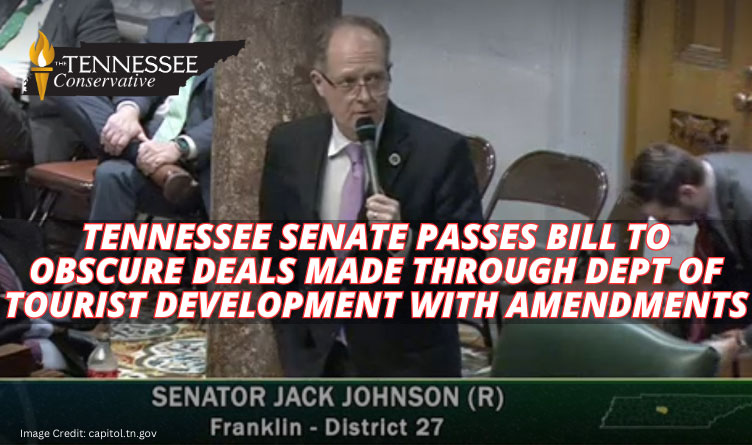Image Credit: capitol.tn.gov
The Tennessee Conservative [By Kelly M. Jackson] –
This week the Tennessee State Senate passed on a vote of 24-6 to block the access of the public to records that detail deals made through the state Department of Tourist Development. With amendments made after the bill was already passed in the House in a different form, the bill will now head back to that chamber to be discussed again.
The bill, HB1692/SB2093, will allow records from the Tennessee Department of Tourist Development to be exempt from public records laws if the tourism commissioner and attorney general deem them “sensitive.”
The Senate version of the bill (SB2093) is being carried by Senator Jack Johnson (R-Franklin-District 27). The House version of the bill, House Bill 1692 (HB1692), is sponsored by Representative William Lamberth (R-Portland-District 44).

According to reports, due to the protracted period of debate in both chambers, (the bill was passed in the House in January) some amendments were added to the Senate version in order to allay some concerns that were had by some of the committee members.
The language that was added was done so with the purpose of defining how long documents could remain secret without being destroyed.
The House version of the bill states that “sensitive” information can be obscured from public access for up to two-five year periods.
The timeframe in the House bill was of some concern for a handful of legislators who pointed out that there are state regulations that allow for contract records to be destroyed after only six years of retention. The obvious issue here being that they never actually see the light of day in order to be viewed by the public.
The amendment in the Senate version of the bill changed the language to reflect different scenarios through which the contracts could be released for public consumption: 10 years have passed since they were declared sensitive; state funds were disbursed; or “the conclusion of the event in which the contract or event was negotiated.”
Despite the language additions, there was still skepticism that appeared to be bi-partisan.
During floor debate, Senator Todd Gardenhire (R-Chattanooga-District 10), stated, “Anytime we tinker with open records laws and allow exemptions for different bodies and stuff, I think we’re going down a slippery slope. Respect to Senate sponsors, but I’ll be voting no on this.”

On the other side of the aisle, the same sentiments were repeated, by Senator Charlane Oliver (D-Nashville-District 19), who said, “What could possibly be so secretive that we’re trying to hide, and that the public doesn’t have the right to know, when it relates to tourism?”
“Why do we need a bill like this? … What is so sensitive that we can’t allow the public to have a right to know how their taxpayer money is going to be used?” Oliver questioned.
The General Assembly website records the Senate votes on SB2093 as follows:
Representatives voting aye were: Alexander, Baum, Boyd, Bricken, Bulso, Burkhart, Butler, Carr, Carringer, Cepicky, Chism, Cochran, Crawford, Davis, Eldridge, Faison, Farmer, Freeman, Fritts, Gant, Garrett, Gillespie, Grills, Haston, Hawk, Hazlewood, Helton-Haynes, Hicks G, Hicks T, Holsclaw, Howell, Hulsey, Hurt, Jernigan, Johnson C, Keisling, Kumar, Lamberth, Leatherwood, Littleton, Lynn, Marsh, Martin G, McCalmon, Moody, Moon, Powell, Powers, Ragan, Raper, Reedy, Rudd, Rudder, Russell, Shaw, Sherrell, Slater, Sparks, Stevens, Thompson, Todd, Travis, Vaughan, Vital, Whitson, Williams, Wright, Zachary, Mr. Speaker Sexton — 69.
Representatives voting no were: Barrett, Behn, Camper, Clemmons, Dixie, Glynn, Hakeem, Hardaway, Harris, Jones, Miller, Parkinson, Pearson, Richey, Towns, Warner — 16.
Representatives present and not voting were: Capley, Doggett, Hale, Terry — 4.
Because the House and Senate versions differ, the bill will need to go back to both chambers for them to sort out those differences before heading to Governor Lee’s desk for a signature, should he decide to sign it.
According to Lamberth, the legislation actually comes at the request of the Department and Governor Bill Lee’s administration.
The current proposal in both bills allows for the commissioner of the department of Tourist Development or the Attorney General (both appointed) to determine how “sensitive” is actually defined.
A similar law was passed in 1988 for the Tennessee Department of Economic and Community Development, allowing that department to keep records secret for five years.


About the Author: Kelly Jackson is a recent escapee from corporate America, and a California refugee to Tennessee. Christ follower, Wife and Mom of three amazing teenagers. She has a BA in Comm from Point Loma Nazarene University, and has a background in law enforcement and human resources. Since the summer of 2020, she has spent any and all free time in the trenches with local grassroots orgs, including Mom’s for Liberty Williamson County and Tennessee Stands as a core member. Outspoken advocate for parents rights, medical freedom, and individual liberty. Kelly can be reached at kelly@tennesseeconservativenews.com.



3 Responses
Know who’s paying them.
In politician speak “sensitive” means crooked. It means wheels and deals at taxpayer expense that we have no input on.
Sounds like Gardenshire got it right on this one >”Senator Todd Gardenhire (R-Chattanooga-District 10), stated, “Anytime we tinker with open records laws and allow exemptions for different bodies and stuff, I think we’re going down a slippery slope. Respect to Senate sponsors, but I’ll be voting no on this.”